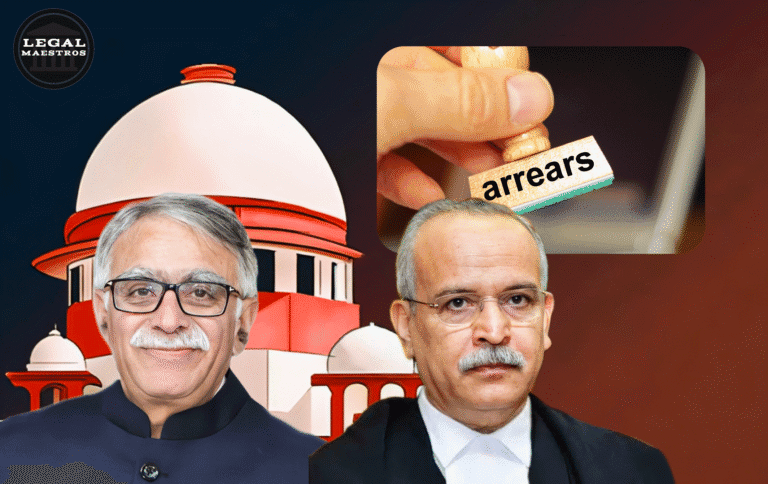
A very important question was raised very recently by the Supreme Court of India regarding the validity of documents signed by a holder of the power of attorney and brought to him to get it registered. In the case, G. Kalawathi Bai (Died), per LRs. versus G. Shashikala (Died), per LRs., and others etc., the construction of various important provisions of the Registration Act, 1908, was under consideration and the case was of revival of a case of interpretation of important provisions of the Registration Act 1908. The gist of the argument is the question of whether the holder of a power of attorney who does transact any document on behalf of a principal is the subject to be registered as the executant of the document.
Case History Case Background
The appeals in this case were as a result of a resident dispute against the validity of an Irrevocable General Power of Attorney dated October 15, 1990, which was supposedly signed by Ranveer Singh and Gyanu Bai on behalf of G. Rajender Kumar. Thereafter, G. Rajender Kumar in his capacity as power of attorney holder entered into three registered sale deeds on November 16, 1990, July 18, 1991 and August 16, 1991, which are registered in the favour of his wife G. Shashikala. In his written statement in the suit, Ranveer Singh refused that he had signed the General Power of Attorney.
On basis of such denial, the Trial Court framed an issue whether Ranveer Singh had been nominated G. Rajender as his General Power of Attorney and whether the sale deeds executed by G. Rajender in favor of G. Shashikala are done. At a subsequent stage, its admissibility of General Power of Attorney and the three sale deeds was challenged and the Trial Court framed additional issues under a High Court order. Among them was that of whether the G.P.A. of October 15, 1990 was authenticated as stated under section 32, 33, 34 and 35 of the Registration Act (1908). The other question included whether the Registrar had identified G. Rajender Kumar who was the said holder of power of attorney at the time of execution of the three sale deeds as it needed to be identified under Section 34(3) (c) of the Act read with Rule 53 of framed rules.
For More Updates & Regular Notes Join Our Whats App Group (https://chat.whatsapp.com/DkucckgAEJbCtXwXr2yIt0) and Telegram Group ( https://t.me/legalmaestroeducators ) contact@legalmaestros.com.
Rajni Tandon Precedent
In the line of arguments, a precedent ruling by the Supreme Court was cited earlier.
The case in Rajni Tandon vs. Dulal Ranjan Ghosh Dastidar and another (2009) was referred as the High Court had taken a precedence of the same. In
Rajni Tandon, a notarized power of attorney gave the power to the agent with reference to the transfer of property and the obligation to conclude the necessary documents. Sale deed was executed by the holder of power of attorney already and was submitted to registration, and this was refused, on the basis, that a duly authenticated power of attorney should have been presented.
The Bench in
The question in the case as framed by Rajni Tandon was: whether an individual who signs a document on behalf of the terms of the power of attorney, is the actual individual of the document as far as the registration office is concerned and qualified under Section 32(a) to present the document and get it registered. The Court through
Rajni Tandon was of opinion that the term, person executing in Section 32(a) of the Act covers a principal that acts through agent. It has maintained that when an individual is granted a power of attorney which makes them act as an agent in executing a document, then to the registration office; it is they who can present it to registrar under Section 32(a).
Rajni Tandon held that an agent who, executes, signs and appears, produces and presents deed and acknowledges the same to the registering officer is not a presentation under the Section 32(c) of the Act and thus, Section 33, which ought necessarily to be cauterized with the power of attorney would not come in its way. This in effect meant that where the holding of power of attorney was entitled to sign a document, then the holder of the power of attorney was entitled to be the executant and need only submit and register under Section 32(a) without having to satisfy the tests of authenticated powers of attorney.
Statutory Scheme registration act, 1908
In order to to see the reasoning of the Court we need to see the sections of Registration Act of the year 1908. Section 32 to 39 of the Act are in Part VI which covers the issue of presentation of documents to be registered.
In section 32, registered documents can be presented by a lawful basis:
- The text of section 32 (a) is in reference to either, some person executing or claiming under the same.
- Section 32 (b) mentions the representative, or the assign of such a person.
- It is by the presentation, by the agent of such person, representative or assign, duly authorized by power-of-attorney, “in a form hereinafter mentioned”: see Section 32 (c).
The type of powers of attorney that are accepted under the provisions of Section 32 is stated in Section 33 and the authentication of these powers of attorney must occur by a Registrar, Sub-Registrar, Magistrate or by a Notary Public, depending upon where the principal resides.
In Section 34 (3), the registering officer has imposed the responsibility to enquire whether the document has indeed been signed by the persons who have represented themselves to be, satisfy himself as to who are the persons, and in the case of a representative, assign, or agent, of his right to appear. The Section 35 also obliges that the officer registering must be satisfied as regards the competence and identity of the individual providing the document. The provisions of rules 49 to 55 of the Andhra Pradesh Rules made under the Act also provide the conditions to comply with the Section 33 and in Rule 53, a registered power of attorney is required to be authenticated in order to be registered.
The Dissenting View in the Current Court as Regards Rajni Tandon
The sitting Bench in the Supreme court has opined that it cannot concur with such a stand as was adopted.
Rajni Tandon. The Court turned to the logic that a holder of power of attorney signs not in his/her name, but the name of his/her principal by signing the document not as an agent on his/her behalf, but as a signatory to the document on the agent on the basis of the authority, which is embodied in the power of attorney. Hence, the holder of power of attorney is not called the “executant” as cited in Section 32(a) of the Act. The transfer document always listed the principal as the executant who is represented by the holder of the power of attorney. The Court stressed that the holder of the power of attorney is still an agent and only signs and makes actions on behalf of the principal.
The Court noted that as a rule, a power of attorney enables the person who is the holder of this document to not only sign but also to produce documents in order to have them registered. In the given case, the accused Irrevocable General Power of Attorney had expressly given power to G. Rajender Kumar to sign all documents of transfer and before registering authority to submit it in the name of principals. Well that means that when a power of attorney holder brings a document to be registered after gaining signature to it as an agent, it is not because he is the executant under Section 32(a), but is so because the Section itself amongst others allows to do so in virtue of the fact that he is specifically empowered to do so by the delegation of authority under the power of attorney itself.
The Court pointed out to an incongruous situation which would set in as a result of the
Rajni Tandon Meaning. In such a view, notarized holder of power of attorney doing a sale deed would qualify to be an executant under 32(a) and he/she could get the document registered without any additional requirements. But where such same holder of the power of attorney subsequently conferred power of attorney upon yet another person with the sole intention of getting the executed sale deed registered, even in a case where the second power of attorney may be registered, such power would still have to pass the tests provided in Sections 32(c), 33, 34 and 35. This means that the simple mechanical act of mere presentation would undergo great examination whereas the heavier act of making a transfer of immovable property in the name of the real owner though the transfer was a transfer by a person having an unregistered or notarized power of attorney would escape these examinations.
Moreover, the Court had observed that
Rajni Tandon failed to pay the proper attention to the in-depth inquiry that must be made by the registering officer at the time of Section 34(3) of the Act and Section 35(2) of the Act. The Registrar was supposed to prove himself that he is not only satisfied with the identity of G. Rajender Kumar but also the right to fill the signatures of Ranveer Singh and Gyanu Bai. The power of attorney would have to undergo all the required tests in order to conduct this verification. An appointment of G. Rajender Kumar as an executant would prove to be contrary to the recitals in the sale deeds itself, which names the principals as the executants.
Excitement to a Greater Bench
Stating this rather strongly, the Supreme Court grounded that a power of attorney holder cannot lose its status as an agent insofar as it signs a document on behalf of its principal and thus remains an agent rather than a specifically acting party in its own right. An agent of this nature would still fall under the provisions of Section 32(c) of the Act and accordingly would present the signed document only in its capacity as an agent and accordingly would require to meet the conditions of Sections 32(c), 33, 34 and 35 of the Act and the associated rules.
Seeing that it does not agree with the precedent, set as it is
The present Bench, as expressed by Rajni Tandon, was in need to have this vital matter addressed and finally determined by a higher Bench. On this basis the Registry has been asked to approach the Chief Justice to seek necessary orders to get these appeals listed on by a larger Bench as early as possible. This ruling would be very important because it would bring uniformity with clarity in the manner in which the registration Act on the validity of powers of attorney and their implication in the transfer of property would be appraised and they will be verified effectively.



